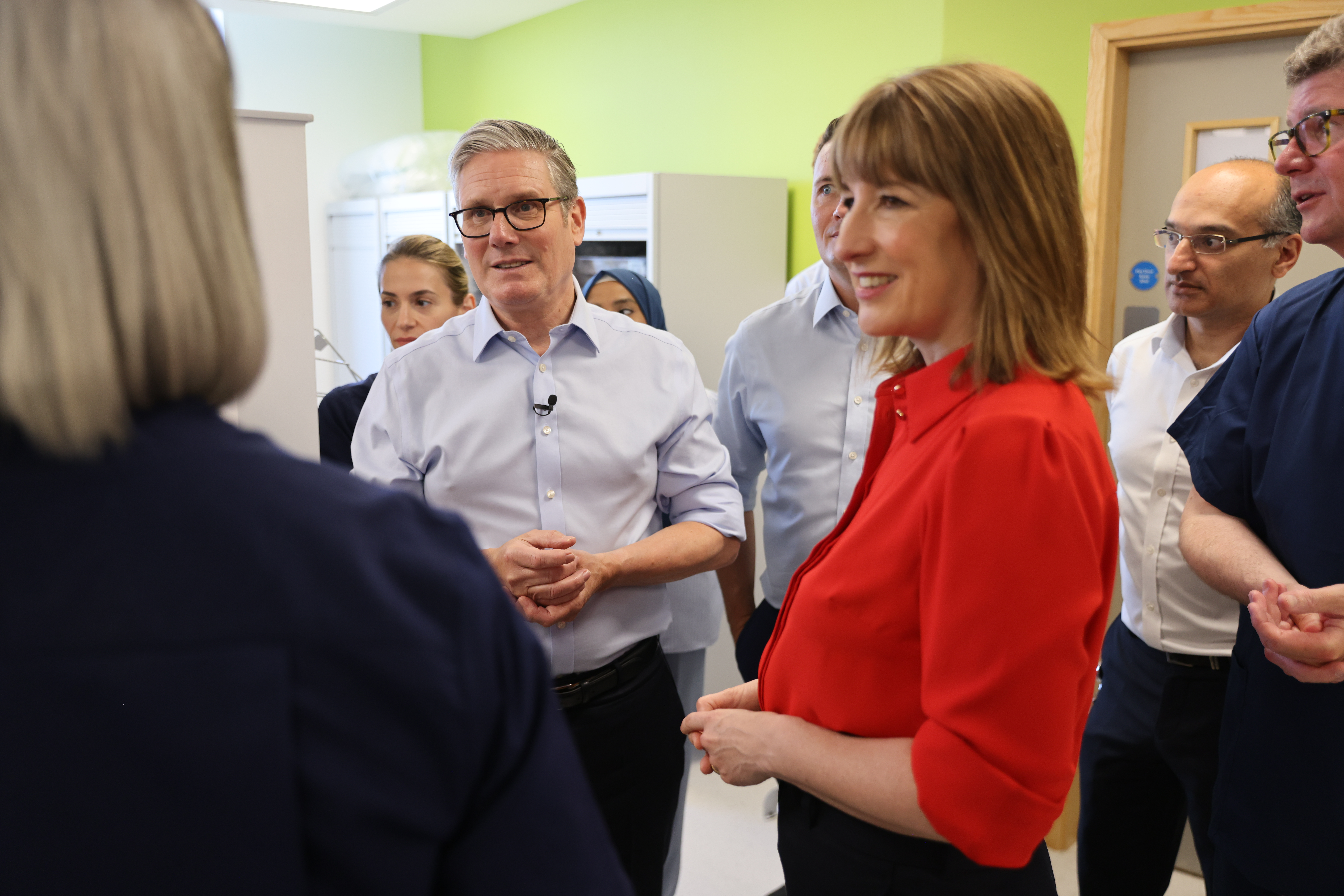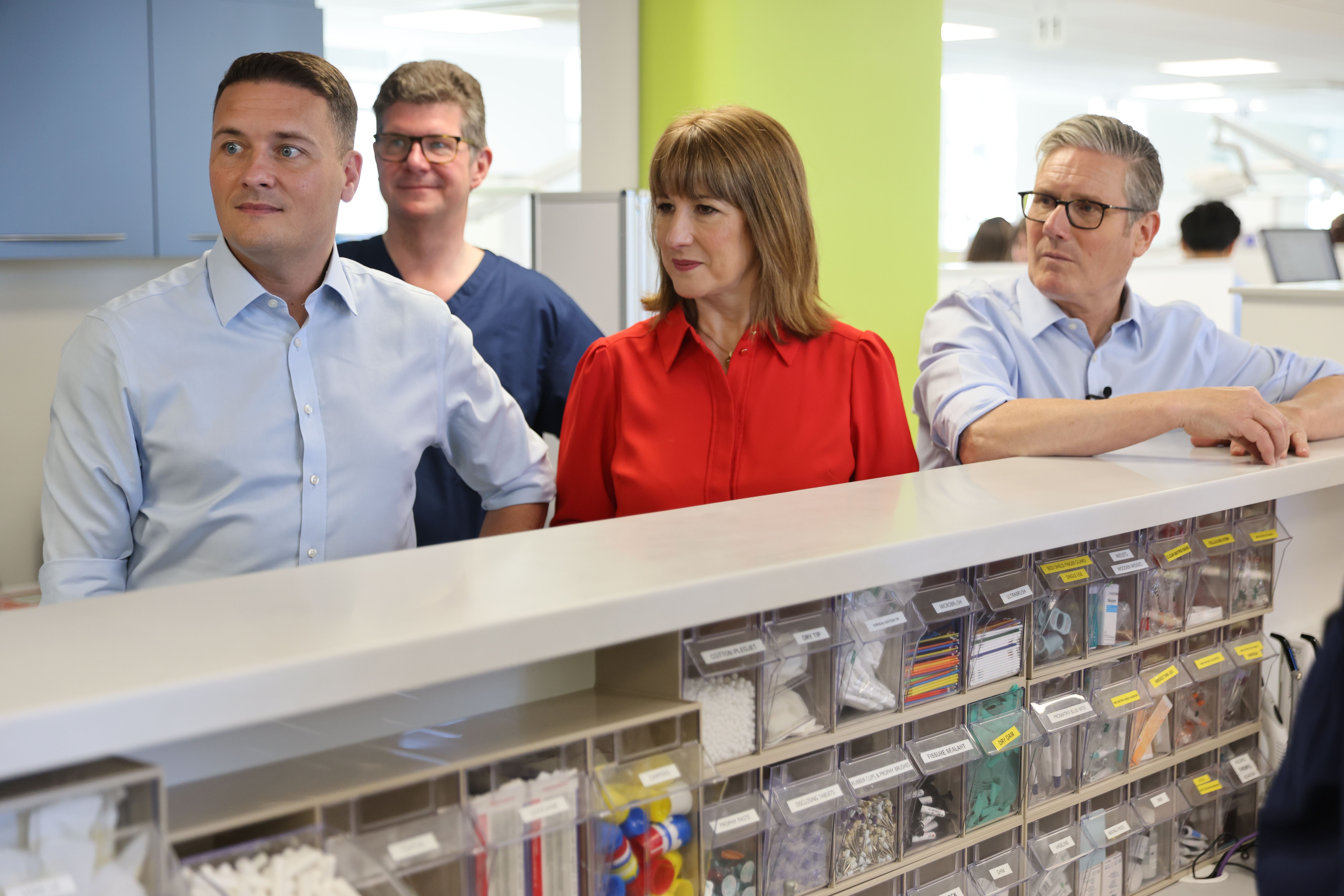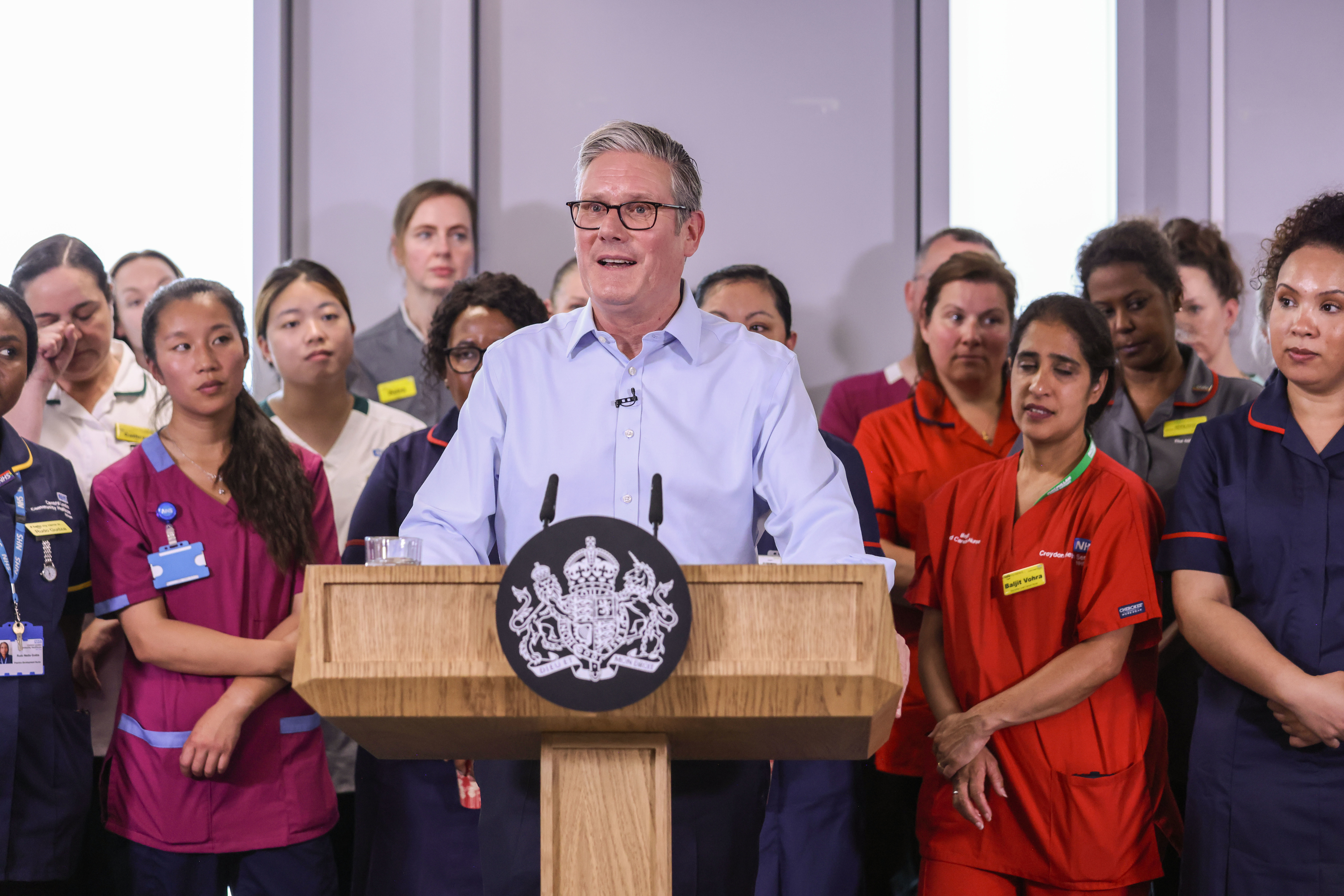
The “future already looks better for the NHS” under Labour, Sir Keir Starmer has said, as he published a radical plan to transform the health service.
The new 10-year plan for the NHS sets out a series of shifts to bring care much closer to people’s homes, reducing the reliance on hospitals and A&E.
Under the changes, there will be fewer staff working in the NHS than previous projections said were needed, with far more providing care closer to home and fewer working in hospitals.
Key reforms include a greatly enhanced NHS app to give patients more control over their care and more data at their fingertips, new neighbourhood health centres open six days a week and at least 12 hours a day, and new laws on food and alcohol to prevent ill health.
The Prime Minister was accompanied by Chancellor Rachel Reeves as he set out the plans on Thursday – she was making her first appearance since she was seen crying in the Commons on Wednesday.
Speaking in east London, Sir Keir said: “It’s all down to the foundation we laid this year, all down to the path of renewal that we chose, the decisions made by the Chancellor, by Rachel Reeves, which mean we can invest record amounts in the NHS.”
Sir Keir acknowledged improvements were needed in the NHS but said the situation was better than when Labour first took power.
“I’m not going to stand here and say everything is perfect now, we have a lot more work to do and we will do it,” he said.
“But let’s be under no illusions: because of the fair choices we made, the tough Labour decisions we made, the future already looks better for our NHS.
“And that is the story of this Government in a nutshell.”
He said Labour was “putting in the resource… and we’ve got the resolve to see this through”.
He added: “I genuinely agree it’s only Labour governments that can do this. It was a Labour government that created the NHS in the face of opposition from others. The Conservative Party couldn’t have done it, and we did it.
“I think it’s only a Labour government that can therefore make the NHS fit for the future… we’ve got the resolve to do it, the determination.”
Health Secretary Wes Streeting told NHS staff gathered at the event that Labour rejected the “pessimism” which says the “NHS is a burden, too expensive, inferior to the market”.
Ms Reeves embraced Mr Streeting as he came away from the podium and told those at the launch event: “Our 10-year plan will get the NHS back on its feet and make it fit for the future, led by our fantastic NHS staff, and a huge thank you to every single one of you.”
Ms Reeves smiled and was upbeat as she added: “I want to be clear, we are spending money on taxpayers’ priorities, but that wouldn’t have been possible without the measures that we took in the budget last year.
“We fixed the foundations and we’ve put our economy back on a strong footing.”
The new health plan sets out how the NHS will move from analogue to digital, treatment to prevention, and from hospital to more community care.
The “status quo of hospital by default will end” and by 2035, the intention is that the majority of outpatient care will happen outside of hospitals.
New neighbourhood health services will give people access to a full range of services, leaving hospitals to focus on the sickest.

The plan sets out:
– By 2028, the NHS App “will be a full front door to the entire NHS” and act as a “doctor in my pocket” for patients. A new part of the NHS App called My NHS GP will “help patients better navigate the health service”, powered by artificial intelligence (AI). Those who do not have an urgent or emergency need, but who are struggling to find an alternative to A&E, will be signposted to places they can get care. The app will use AI algorithms to take a patient’s symptoms, ask follow-up questions and provide guidance. The app will also help patients book a remote consultation if they need one, or a face-to-face appointment if they prefer. People will be able to book, cancel and move appointments.
– Patients will be given more app support to book their own urgent appointments rather than facing long waits in A&E. Clinical professionals will also be able to triage patients in advance.
– In order to make the move “from bricks to clicks”, the plan said people will have a single patient record combining their health records plus personalised information to help improve their health.
– Patients will be able to use the app to choose their preferred provider, see whether it delivers the best outcomes, has the best feedback or is simply closer to home through a section called My Choices. The app will also show data on clinical teams and clinicians.
– Wearable technology will become the “standard in preventative, chronic and post-acute NHS treatment by 2035”. All NHS patients will have access to these technologies, which will be part of routine care. The NHS will provide devices for free in areas where health needs and deprivation are highest.
– Real-time data from wearables, biometric sensors or smart devices will also be able to feed vital data into the app such as step count, heart rate and sleep quality to provide personal health advice.

– People will be able to use the My Consult area of the app to hold consultations, or book directly into tests where clinically appropriate through My Specialist.
– My Medicines will help people with drugs and prescriptions, while My Vaccines will provide clear information of current jabs.
– Parents can manage their children’s health through My Children, or co-ordinate the care of a loved one or relative through My Carer. The red book for children will be scrapped and moved into the app.
– New mental health emergency departments will be created so people do not end up in A&E. Over the next five years around 85 will be established – close to or inside half of major A&Es.
– Over time, hospitals will get less of the NHS budget as it is redirected to community care, which means “less acute space, fewer emergency staff based in hospitals and fewer outpatient departments in future”. The process of booking appointments will become automatic rather than involving lots of staff.
– An end to the 8am scramble for GP appointments by training thousands more GPs and building online advice into the NHS app. AI will be used for notes and letters to free up GPs’ time.
– A new “moonshot to end the obesity epidemic”. The Government will restrict junk food advertising targeted at children, ban the sale of high-caffeine energy drinks to under 16-year-olds, and reform the soft drinks industry levy. It will introduce mandatory health food sales reporting for all large companies in the food sector and introduce a “mandatory requirement for alcoholic drinks to display consistent nutritional information and health warning messages”. More support will be given to the no and low-alcohol market.
– Dentists could be forced to work for the NHS for at least three years if they have been trained at taxpayer expense.

– Hospital patients will not be booked in by default for follow-ups, with “patient-initiated follow-up a standard approach for all clinically appropriate pathways by 2026”.
– A new campaign will motivate millions of people to move more on a regular basis.
– Expansion of mental health support, including in schools.
– Lung cancer screening for those with a history of smoking will be fully rolled out across England.
– An end to the “disgraceful spectacle of corridor care” and ensuring 95% of people wait no longer than 18 weeks for routine care.
– Higher standards will be set for NHS leaders to reward good performance and penalise poor work.
– Patients to be given more say on whether the full payment for the costs of their care should be released to the provider.
– Efforts to cut the NHS sickness absence rate and more power to managers “to reward high performing staff, and to act decisively where they identify underperformance”.
– Priority given to UK medical graduates and an ambition to reduce international recruitment to less than 10% by 2035.
Nuffield Trust chief executive Thea Stein said the plan contained “little detail on how the ailing health service is to deliver these changes.”
Royal College of Nursing (RCN) general secretary, Professor Nicola Ranger, said: “Nursing staff are crying out for change and we stand ready to get behind this plan.
“Modernising services, bringing care closer to home and helping people to lead healthier lives couldn’t be more necessary…
“Nursing staff are identified today as the expert leaders to deliver a neighbourhood health service and that should be truly empowering. As the professionals delivering the vast majority of care, we know what keeps patients safe and well.”







